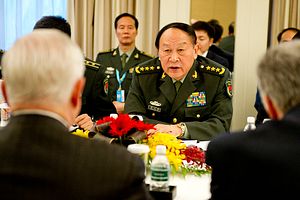In 2011, China sent its defense minister (General Liang Guanglie at the time) to the Shangri-La Dialogue (SLD) in Singapore, the most anticipated and discussed annual security dialogue in Asia. It was hoped this would be the start of a new trend of high-ranking Chinese participation at the annual dialogue. That hope was quickly dashed; the next year, in 2012, China chose not to send a Ministry of National Defense official at all. Instead, Beijing’s delegation was led by Lt. General Ren Haiqan of the Peoples’ Liberation Army (PLA) Academy of Military Science.
The SLD, though hosted by a think tank (the U.K.-based International Institute for Strategic Studies), has long attracted high-level officials from participants, including the routine presence of defense ministers. As my colleague Prashanth Parameswaran pointed out in his recent preview, this year’s SLD will be attended by “defense ministers from the United States, Australia, Canada, France, Indonesia, Japan, Malaysia, New Zealand, and the Philippines.” This year, however, China will once again be represented by an as-yet unspecified officer from the PLA Academy of Military Science (likely Lt. Gen. He Lei, vice president of the AMS, according to the SLD agenda).
The obvious discrepancy between China’s level of participation and other Asian states’ requires some explanation. Why is China sending a representative with no formal government position to lead its delegation to Asia’s premier security forum?
From 2013 to 2016, China’s delegation was headed by an officer at the deputy chief-level in the PLA hierarchy. In 2013, that was Lieutenant General Qi Jianguo, deputy chief of the PLA General Staff, followed by another deputy chief of the PLA general staff, Lt. Gen. Wang Guanzhong, in 2014. In 2015 and 2016, China sent Admiral Sun Jianguo, the deputy chief of the Joint Staff Department of China’s Central Military Commission, a rising star expected by some to become China’s next PLA Navy chief (although that didn’t pan out). That means, even by Beijing’s standards, its representation at this year’s SLD is a downgrade.
The drop-off in prestige from 2011 to 2012 had an obvious motivation: the 2011 SLD was uncomfortable for Liang. Chinese officials as a rule are most at ease giving boilerplate, anodyne speeches that avoid tackling contentious issues – then leaving the stage without taking questions. That’s not possible at the SLD, and Liang faced a fairly hostile audience. Officials from Vietnam and the Philippines had already aired their criticisms of Chinese conduct in the South China Sea, forcing Liang to play defense. Meanwhile, then-U.S. Defense Secretary Robert Gates used the SLD to highlight what would become known as the U.S. “pivot to Asia,” assuring the audience that “America’s interests as a Pacific nation… will endure.” Apparently Beijing was not pleased with that experience, and decided to rein in its level of participation the next year.
Liang’s one-off attendance at the SLD pointed to a deeper problem China has with the annual dialogue platform. Beijing prefers not to discuss its maritime disputes in any multilateral setting, insisting bilateral negotiations are the proper forum for raising such issues. But the South China Sea is a perennial headliner for the SLD – and China, much to its discomfort, has little influence over the agenda. That means each year, whatever representative China sends to the SLD, will be subjected to questions on subjects Beijing would rather not tackle in an open, multilateral setting.
Rather than help elevate the SLD through sending a high-level representative, China has chosen to boost its own security dialogue: the Xiangshan Forum, held every fall in Beijing since 2014 (and held once every two years from 2006-2012). Update: Bonnie Glaser of the Center for Strategic and International Studies points out that there will be no Xiangshan Forum this year as top leadership focuses on the 19th Party Congress and ongoing reforms in the PLA.
Hosting the Xiangshan Forum allows Beijing to decide which topics will be emphasized – and which will be swept under the rug. Predictably, China highlights the positives of the Asia-Pacific security situation; the themes of last year’s panels included “responding to new security challenges in the Asia-Pacific through cooperation” and “maritime security cooperation.” China can effectively stack the deck, lining up speakers and topics that are agreeable to its self-image and largely inoffensive to everyone else.
Contrast that with some of the topics on the agenda for this year’s SLD: “Upholding the rules-based regional order” (featuring ministers from Japan, Australia, and France, and thus not likely to be a China-friendly discussion) and “nuclear dangers in the Asia-Pacific” (sure to focus on North Korea, again making China a target for criticism). The South China Sea will be on the agenda in the form of a discussion on “practical measures to avoid conflict at sea.”
Even given that, it’s unclear why China has decided against sending a deputy chief-level PLA officer to this year’s SLD. Foreign Ministry spokesperson Hua Chunying said the decision was based on “work requirements” rather than diplomatic messaging, echoing China’s insistence in 2012 that “domestic priorities” had kept Liang from attending the SLD. But that didn’t stop a questioner from a reporter suggesting a chill in China-Singapore relations was the unspoken cause for this year’s downgrade – something Hua flatly denied.
It may simply be that reforms and reshuffles in the PLA have made it too difficult for China to send a higher-ranking representative this year. Ultimately, we’ll have to wait and see to determine whether this is a permanent downgrade, or, like China’s SLD delegation in 2012, an aberration. Next year’s top Chinese representative may return to the deputy chief-level – but if not, Beijing will be sending a clear signal about the value it places on Asia’s most famous security dialogue.

































